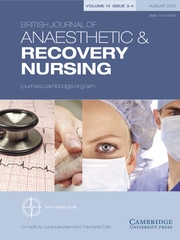Are you an Influential Leader?
I have recently returned from the American Society of Peri-Anaesthesia Nurses Conference, where I had the pleasure and honour of representing BARNA. It is such a great experience and I always return enthusiastic and motivated, not only to improve my own practice but to appreciate that of others as well.
We can learn a lot from each other. What I have learned from the American nurses is that they are not afraid to show their appreciation for each other and give praise where it is due. I sometimes think that our English reserve gets in the way of this and that we should tell our colleagues when they have done well, and be proud of what we do as nurses.
Leadership plays a big part in this process. The influence of each individual nurse is profound, whether a formal leadership title exists or not. There are four main strategies that can be considered. These are creating a workplace culture, promoting professionalism, clarifying managerial expectations and to following up staff discontent.
We must learn to accommodate what is good in what we do and who we are. We can all make personal contributions by storytelling and sharing what we do as peri-anaesthesia nurses. People trust us because we are nurses and will often share their innermost fears and secrets, forming a connection of integrity and truthfulness. Heroism is not our strong point but we should talk about what we do and use advocacy in our practice. Every nurse is capable of leaving their own personal legacy by making a difference everyday to those he/she cares for. We know that the care of our patients always comes first, above anything else. Evidence based practice underpins the whole nature of our work prioritising safety for patients and staff.
We have a huge nursing ‘know-how’ and a wealth of information and nursing experience which incorporates our humour and camaraderie that is quite unique in our profession. It enables us to make the collaboration between nurses and physicians, and I don’t mean some of the ones you see so beautifully portrayed on the television! This can only enhance the care to our patients. Embrace your work, use the information available to you and make sure you share this and discuss it with your colleagues.
Workplace culture is so influential to us. Does your department ‘eat or nurture their young?’ By this I mean, do you welcome new staff, are you resistant to new ideas, are there longevity issues and seniority perks in your department and does this all dictate what people do? How destructive can these be?
An influential leader is going to speak confidently as a nurse and promote the benefits of further knowledge. Keep an open, honest dialogue and listen to others’ points of view and support specific patient care concerns. Make sure that the off duty is reasonable and listen to staff when they have difficulties. Stand behind staff in times of crisis and conflict using power to support and back decisions. You must have an intolerance of irreverence and be confident to address behaviours in your department. Staff discontent needs to be followed up, counsel respectfully and encourage ‘conversations with a filter’. Pick your battles carefully and always utilise scripting. You need to deal with toxic behaviour otherwise it will begin to poison the surrounding area.
Your department should not feel like a daily battleground but feel like you are embracing the challenges of growth and potential as a team. So go out there, and remember, ‘Advocacy in your practice, and be an Influential leader!’


